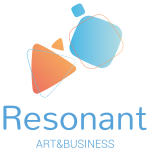NEWS
First Project Meeting
December 20, 2019

The first project meeting, which took place in Copenhagen, has just ended.
We thank all the participants for the contributions given, which are essential for an easy start of the project activities, and in particular we thank the Danish partner for organizing the meeting, for directing the activities and for hosting us all.
We wish everyone good luck for the future development of the project.
The Sound of Business
July 3, 2020
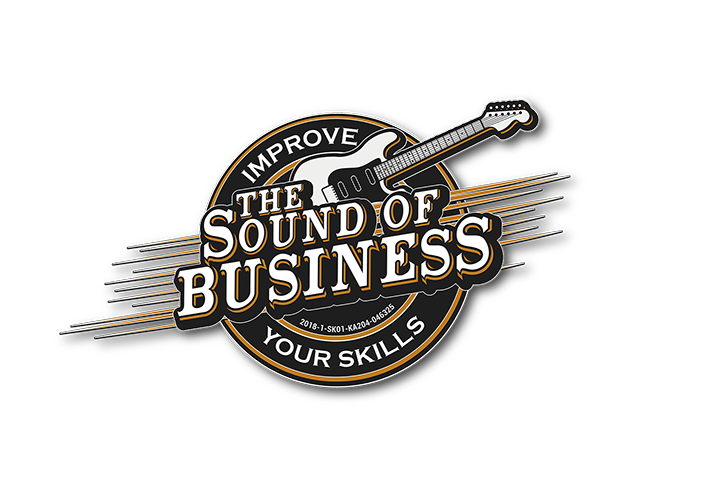
Speaking of points of contact between the Cultural and Creative Sector and entrepreneurship, we want to point out a very interesting project, which includes a partner from our consortium.
“THE SOUND OF BUSINESS – Leveraging the Entrepreneurial Competences of Adults To Extenuate the Business Knowledge Divide” is an ERASMUS+ KA204 project that aims at promoting entrepreneurship education among adults through an innovative training approach based on art and rock music, and to validate the transferred competencies on a European level.
If you want to use music for getting more skilled in management, business and entrepreneurship and learn from the big icons of rock music, visit the project’s website and read more. You can find the link in our USEFUL LINKS section.
Second meeting in Athens
July 10, 2020
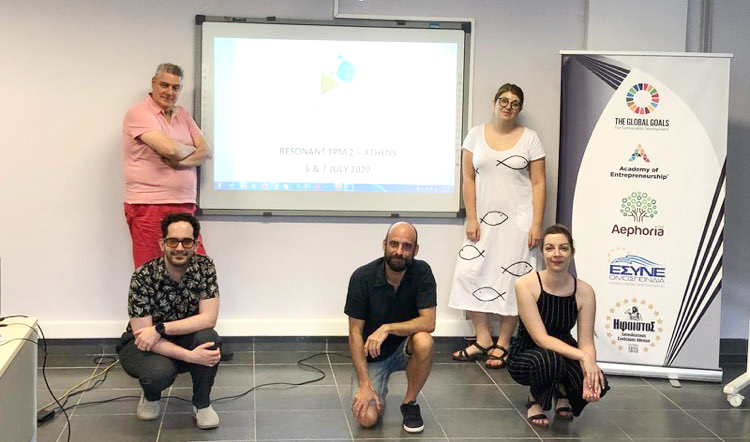
The second project meeting has just taken place in Athens. We especially thank the Greek partner for the excellent organization and for the hospitality in their very particular and interesting facility.
During the meeting we finalized the production of the IO1 which in this way has been finally completed. We also embarked on the production of IO2, taking the decisions that will serve as guidelines for its production.
We thank all the partners and participants in the meeting for the hard work done so far, and we wish everyone good luck in continuing the project.
Intellectual Output 1
is officially finalized
July 13, 2020
In the context of the project, a report on Cultural Entrepreneurship in Europe has been developed by the consortium. The paper constitutes the first intellectual output of the project and its purpose includes:
- to inform about cultural sectors, relevant statistics and policies applied in member states of the consortium
- to disseminate interesting and representative case studies of cultural enterprises in the 4 countries of the consortium
- to recognize the skills that are important for entrepreneurs in the cultural field and identify which ones are more related to the cultural dimension of doing business. Findings will serve as basis for the development of the training course on cultural entrepreneurship (IO2)
- to draw a common definition of the cultural entrepreneur profession
The study includes data on the main cultural business sectors in consortium states and national case studies of cultural enterprises with specific characteristics, with a focus on the recognition of important skills for cultural entrepreneurs, distinguishing those who are more related to the cultural aspect of their occupation.
The partnership outlined the main cultural business sectors that have more impact in the consortium states, and 22 virtuous case studies for cultural enterprises among EU states were displayed.
The research of case studies focuses on profiles that contain the following elements:
- company characteristics: micro and small enterprises, self‐supporting, innovative
- artistic expression characteristics: creativity, interpretation of local tradition and history
The main data for the recognition of important skills for cultural entrepreneurs were retrieved by semistructured interviews with cultural entrepreneurs and VET trainers on entrepreneurial subjects. Findings were supported via the case studies identified in the member states of the consortium. Starting from the findings of interviews, a grid of skills for cultural entrepreneurs was developed, using as reference competence frameworks (EntreComp, ESCO).
With regards to soft skills, 4 skills areas have been identified and developed further in skill sets and descriptors, while for hard skills the same procedure was applied to 1 identified skill area:
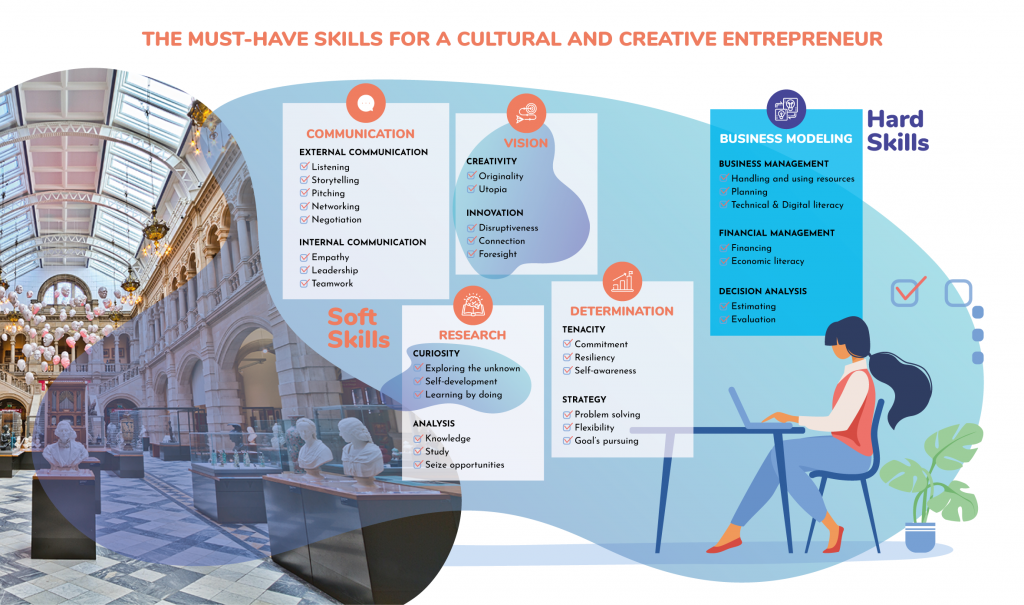
Nonetheless, some of the skill sets are more connected to the cultural aspects of their business whereas others could be identified to be the same as for other types of entrepreneurs.
For a cultural entrepreneur is fundamental to balance their cultural identity with the entrepreneurial one. The components found to be more related to their cultural identity are Curiosity skillset and the Vision area with both its skillsets. Nonetheless the Communication area was identified as significant for cultural entrepreneurs’ success.
Cultural entrepreneurship is a new field of the cultural sector. Some attempts have been made during last years to capture the essence of entrepreneurship in this industry. Combining all relevant elements researched by the consortium, the following definition has been formed for the professional profile:
A cultural entrepreneur seeks to promote and bring value to the preservation and development of culture and heritage and transmits knowledge through their activities by handling human, material and non-material resources and setting goals to generate profits; pictures their vision for creativity through originality and innovation, being curious about unknown paths and utopian in the sense of changing the world with creative business practices.
RESONANT LTTA in Ancona
January 04, 2022
In mid-December, our partner Sineglossa held a wonderful Learning, Teaching and Training Activity in their interesting premises in Ancona.
It was a three-day working activity planned to verify, correct and perfect what was produced by consortium’s communal effort for project’s IO2.
Unfortunately, due to the well-known global situation, one of the partners had to join the activity through online meeting platforms but, thanks to our host’s efforts, no difficulty was generated by this need.
At first, we thoroughly tested the learning type self-assessment questionnaire and we identified some minor changes that when implemented will further enhance the quality of the produced material.
We then proceeded in testing the exercises produced for IO2’s second part. We realized that apart from a few minor corrections (like exact timings for exercises’ execution) the work done was already really well structured and of high quality. Not to forget that the exercises were really fun to test.
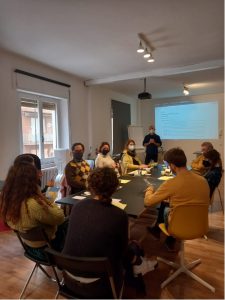
Lastly, during the activities a lot of interesting perspectives emerged not only in regard to IO2’s results but also in relation to IO3’s implementation procedure and its desired final outcome.
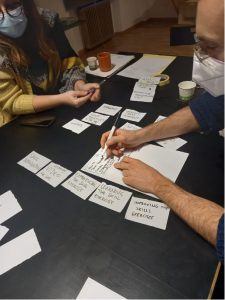
We want to renew our thanks to the hosting and organizing partner, Sineglossa, for the incredible job done for this LTTA and we want also to thank the participants from all the other partners for their motivated and interested participation and help.
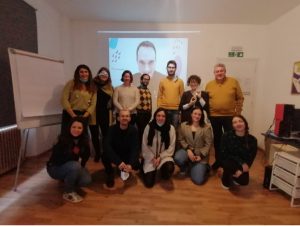
We want to wish everyone good luck in the steps that are missing for project’s completion!
